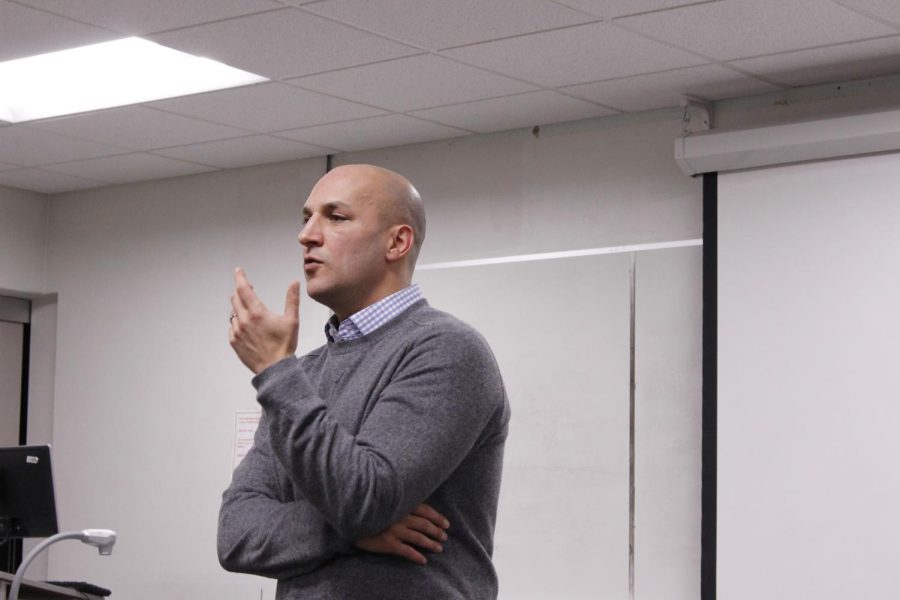Democratic gubernatorial candidate makes stop in Kent for community Q&A
November 29, 2017
Ohio state Sen. Joe Schiavoni visited Bowman Hall Tuesday night to speak with students and community members as part of his campaign for Ohio governor.
After a brief introduction detailing his upbringing in Boardman and his time as a workers’ compensation lawyer, Schiavoni took questions from those in attendance.
One student in attendance asked Schiavoni what more can be done to combat the increasing rates of addiction and death in relation to opioids that have left a massive impact on communities statewide.
“The plan we currently have for drugs in Ohio isn’t getting the job done,” Schiavoni said. “(Ohio Gov. John) Kasich’s plan is called ‘Let’s Start Talking,’ and, I mean, we’ve been talking about this for a long time. We’re not doing anything.”
In May, alongside state Sen. Kenny Yuko, Schiavoni proposed Senate Bill 154, which would have reallocated $200 million in rainy day funds to combat the opiate crisis. The bill has yet to be voted on by the state Senate.
Schiavoni wants to shift the focus of the battle against the opiate crisis to include not only taking drugs off the streets and reducing opportunities for addictions to develop, but to continue assisting those with addiction throughout their recovery.
“Oftentimes, when I go talk to addicts or I talk to doctors, you can get somebody (into rehab), and you can get them clean,” Schiavoni said. “But then when they walk out of the place, they’ve got nowhere to go. It’s about investing at the end there. And so that’s where most of the money out of the $200 million that I put forward would be dedicated toward.”
Anthony Erhardt, a senior political science major and former president of the College Democrats, asked Schiavoni about his stance on recreational marijuana legalization.
“I don’t have a problem with the legalization of marijuana if, and only if, the money is used for a dedicated source,” Schiavoni said, “whether … it goes directly to public education or goes directly to brownfield remediation or it goes directly to neighborhood redevelopment or goes directly to something. I just don’t want to do it where we just legalize it, and then you have all the money go to the state coffers, and then it goes God knows where, like with the lottery.”
The state has legalized medical marijuana already, with growing sites and dispensaries in development.
When it comes to getting the nod in the Democratic primary election, which is set for May 8, 2018, Schiavoni is not without competition; he’s one of five candidates running for the Democratic slot in the gubernatorial race.
One of the other candidates, William O’Neill, is under fire for comments he made in response to the ongoing public debate about sexual assault and harassment of women by men in power. In a Facebook post, O’Neill said he was disappointed by the recent accusations of sexual misconduct leveled against Sen. Al Franken (D-Minn.), calling it a “feeding frenzy” on heterosexual men, before detailing parts of his own sexual history.
“I don’t know if I’m the person to say the guy should resign,” Schiavoni said after Erhardt asked his opinion on O’Neill’s comments. “He’s termed out of his seat, and he said he’s running for governor, but I don’t think he ever will. So I think he is basically resigning. It’s just going to happen naturally.”
“I’m not sure I understand the quote,” O’Neill said in a response to Schiavoni’s comment. “I’m not termed out. I’m in the middle of a Supreme Court term, where I was sent to the Supreme Court by 2 million Ohioans. I see no basis for my resigning either from the Court or the governor’s office. … I believe the senator’s time would be better spent doing his job, rather than wandering around the state criticizing me.”
O’Neill went on to criticize Schiavoni — and the state Senate’s — actions against the heroin epidemic.
“I would direct the senator’s attention to the fact that 4,000 people are dying of heroin overdoses in Ohio,” O’Neill said. “The Ohio Senate has done nothing to correct that action.”
After the event, Schiavoni said if he gets elected governor, he will push for more funding for public universities.
“If you look at the last 20 years, the state has funded state universities less but asked them to do more,” Schiavoni said. “It’s about investing in higher (education) properly so universities don’t feel the need to increase tuition on their kids.”
He also mentioned a program he intends on implementing to relieve student debt for college graduates.
“If you graduate from a state university (and) buy a home within five years in the state of Ohio, the state would cover a portion of that person’s student debt to incentivize them to stay,” Schiavoni said. “Now, we have to have jobs for people to stay. So it’s about building the job market and creating more growth as well as keeping our young people here.”
Nicholas Hunter is the academic affairs reporter. Contact him at n[email protected].

























